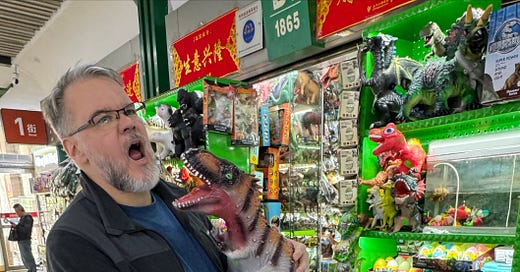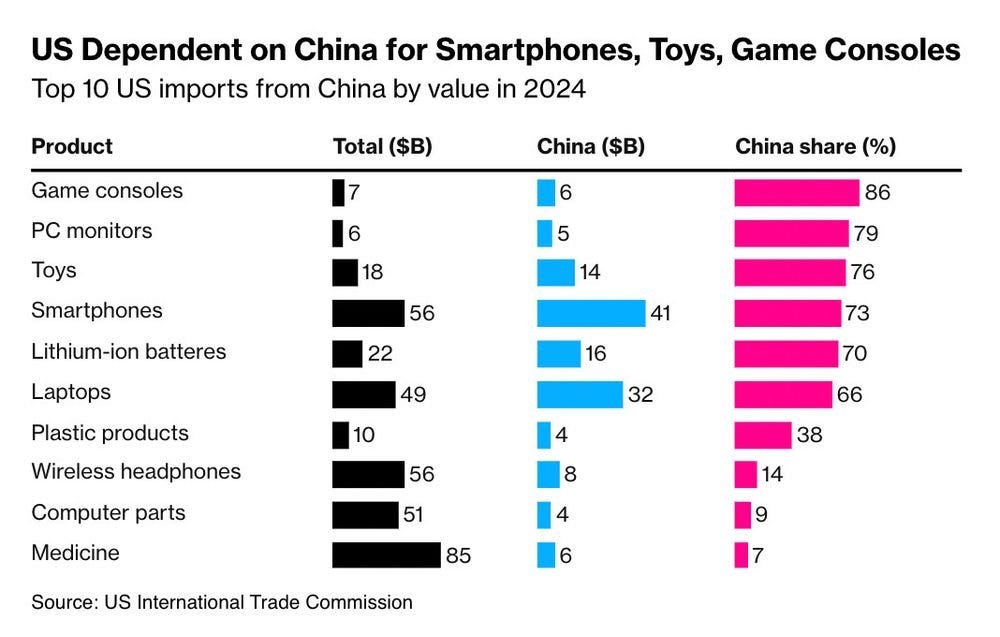I was recently in Yiwu (a trading city close to Shanghai) at the main market (义乌国际商贸城) meeting with suppliers and factories just as “Liberation Day” happened (it was an accidental coincidence). Many asked what would happen next and where things go from here. The major themes discussed were:
1: Further major relocation of supply chains is impractical, as any destination a company chooses could face tariffs in the future. Moreover, it's widely assumed that these tariffs, even those targeting China, will no longer exist within five years.
2: Over the past 8–10 years, businesses and customers have already made substantial efforts to relocate factories and supply chains, adopting the China +1 strategy to enhance resilience. This has involved significant investments in personnel, time, and capital expenditures. Given these commitments, it's unlikely they will undertake another relocation in the near future, as resources are constrained, and the U.S. presents far greater challenges and costs compared to alternative options.
3: As shared by the owner of several large factories in China and Vietnam, there is little interest in engaging with the U.S. or its buyers at this time. Instead, the focus has shifted toward market opportunities in Asia, the Middle East, and Africa.
4: No one will trust the United States anymore, as they come back and re-do, or negotiate, anytime they are unhappy. They are not good partners or customers several told me.
Checking out dinosaurs in Yiwu (义乌国际商贸城)
Why are we here?
Both the US and China feels the other has negatively affected them and is trying to hurt the other.
For the US, China (this is not an exhaustive list):
Causes deaths of US citizens by providing precursors to Mexican cartels who then sell fentanyl in the US
Took factories and jobs away from the US
Steals intellectual property
Discriminates against US companies
Distorts markets through industrial policies and subsidies
Has civil-military fusion on technology that threatens the US
Forces technology transfer
Is trying to dethrone the US and dominate the world
For China, the US (this is not an exhaustive list):
Is trying to stop China’s growth as a country by restricting its access to technology
Restricting Chinese citizens from studying in the US
Has threatened, jailed, persecuted, etc. people of Chinese descent to send a message to China
Tries to undermine Chinese influence around the world
Will not let China contribute to new technology standard-setting organizations
Trying to get its allies to negatively affect China for the benefit of the US
Will only allow China to be a poor country, not one that can become great
Reciprocal tariffs were launched by the US and China, as well as additional restrictions. At the moment we are not only in a full-blown trade war, but risk going into a form of paralysis in the relationship - neither side will move unless the other does.
How the current tariff levels affect US consumers and businesses
Price increases, empty shelves, and maybe no Christmas. Here is a view of the top 10 US imports from China in 2024. Notice the categories of constituents that received exemptions vs. those that did not.
How the current tariff levels affect Chinese consumers and businesses
Buyers of lower end goods are canceling purchase orders (POs) in the next few months (Q2), for orders later in the year, many POs are still active pending confirmation which usually occurs around June or July. Note that for the Christmas season orders start to come in around May-July to be able to produce and ship in time for sales starting aroun Thanksgiving.
Some companies producing goods for sale by Shein, Temu, Amazon, Walmart, and others are stopping orders due to uncertainty. Suppliers of lower end products (such as the dinosaur above) are getting hit the hardest as they either have had their POs canceled, delayed, or have no forecast to understand what (if any) products are to be made.
Consumers in Mainland China have not yet revolted against US products or companies. Starbucks is still full, Disneyland Shanghai has visitors, and Costco is still selling American beef.
Have trade wars like this happened before?
There have been many trade wars throughout history, some of the more interesting ones or ones you may have heard of:
The Boston Tea Party (1773): American colonists protested British taxation by dumping tea into Boston Harbor, sparking tensions that contributed to the American Revolution
The First Opium War (1839-1842): Britain and China clashed over trade imbalances and the opium trade, leading to China's defeat and the cession of Hong Kong to Britain.
The Smoot-Hawley Tariff Act (1930): The U.S. raised tariffs on imports during the Great Depression, prompting retaliatory measures from other countries and worsening the global economic crisis.
The Chicken War (1962): A dispute between the U.S. and Europe over poultry tariffs led to U.S. tariffs on European goods like trucks and brand.
Where do things go from here?
Both sides think they have the power to move the other now in the trading relationship, and each feels aggrieved by the other.
China still hasn’t fired its broadside of punishment, so far only doing minor adjustments such as rare earth restrictions and stopping delivery of Boeing airplanes.
Ultimately both sides lose, but China can and is more likely to last longer than the US. The US already blinked when the bond markets went crazy mid-last week, it is unlikely to take any serious pain in the market for reshoring goals. We have also yet to see what other tariffs and measures will be launched, such as the mentioned new semiconductor and pharmaceutical tariffs. Consumers, businesses, and others in both countries will face higher prices, a shortage of goods, and a lower standard of living over time.
Some have asked is this a prelude to conflict?
No, neither side is interested, nor can they afford, a military conflict. But we are moving closer to that possibility. How can we step back from the brink? Talks would help, so would a realization that we are all on the same planet, and of one race - the human race. These two quotes I think about a lot:
“When goods do not cross borders, soldiers will.”
― Frederic Bastiat




